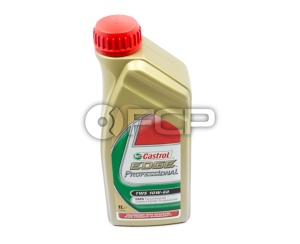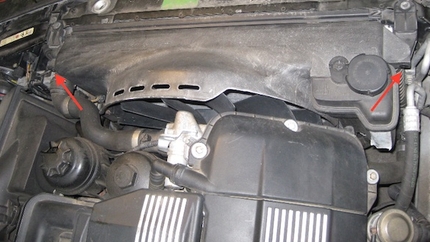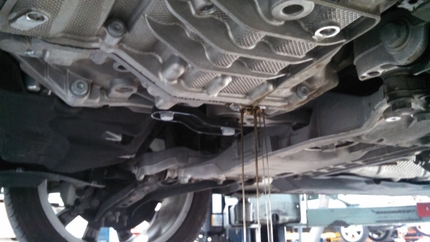- 07/27/2014
- 2 Min Read
- By: Tony Robinett
The Basics of Engine Oil: Viscosity & Applications
There's a lot to be said about motor oil - What is it made of? Synthetic or Conventional? What weight do I use? Whats the difference between different weights? The answers to most of these questions are simple and easy to understand. And understanding a little bit about motor oil can benefit the life of your engine.
What is Motor Oil?
Motor oil is a lubricant used in internal combustion engines to reduce wear on moving parts. It also cleans and carries heat away from the moving parts. Motor oils are made from petroleum-based and non petroleum-based synthesized chemical compounds. In many ways motor oil holds the same importance that blood does for people. Motor oil will hold damaging particles, cool as it flows, and works as a corrosion protector for the internal parts. If there is a serious contamination or loss of function in the oil, damage will incur on the motor.
Oil is Oil....Right?
The difference between synthetic and conventional oil can not be seen, it is found in the molecular structure and properties of the oil. Synthetic oils have always been man-made and they are tailored to have a controlled molecular structure with predictable properties. On the other hand, conventional oil is derived from crude oil that is brought up from beneath the earths crust.
Conventional oils are packed with additives to help them retain viscosity at operating temperature. When these additives run out, your oil does not have the correct "thickness" for your engine. Synthetic oils do not need additives to retain viscosity at operating temperature. This is not saying that they do not have additives, just different additives. When the additives deteriorate in synthetic oil, the viscosity stays the same, rather than thinning like conventional oil.
People get confused thinking that a conventional 5W-30 oil is thicker at operating temperature than 5W-30 synthetic. They in fact run at the same thickness when at operating temperature - approximately 212°F. What makes synthetic oil more beneficial over a 5W-30 conventional is that it is thinner at start-up. Considering that roughly 3/4 of engine wear occurs at start-up, having an oil that is thinner at start up is good because it will flow faster to where it is needed.
Reading the Bottle
The numbers on an oil bottle can be misleading to some people. Their purpose is to describe the viscosity of an oil. While some cars need a 10W-30, others need a 5W-40. As you can notice there are two sets of numbers; this is called a multi-grade oil. The first number being followed by a "W". The "W" stands for winter. A straight 30 grade oil would be too thick for the engine to run in winter, so special additives were developed to add a wider range of viscosity to the oil. The reason for this is that the oil in an engine can have a wide temperature range that it is exposed to from your first start of the day in the winter, to full operating temperature in the middle of a summer day. Multi-grade oils are super convenient because they allow you to use only 1 type of oil throughout the whole year.
So while your engine requires the viscosity of a 30 grade oil when it's at operating temperature, that oil also has the viscosity of a 5 grade oil when it is cold. This helps with oil flow at initial start-up, because having a 30 grade oil at start-up in the winter is much too thick.
Know your Engine!
"What oil should I use?" This question is not easily answered because everyone typically has a different vehicle and lives in different climates. A good starting point is by checking the manual that came with your vehicle. The manufacturer designed the motor and tested it to work with a specific oil and for the most part, you should use that oil. Now I say "for the most part" because you do not have to use the oil specified by the manufacturer. I have tried several different oils with different weights on my BMW E36 M3 searching for an oil that provided adequate viscosity at start-up so I don't get VANOS noise, but also has adequate viscosity at operating temperature to protect my engine. When I was done, I found that 10W-40 synthetic during the summer and 0W-40 during the winter fit perfectly for where I live.
It is important to take into account your local climate. Living in the great northwest, we get cold winters and hot summers, so I need an oil the will not thicken to sludge in the winter, and also will not represent the viscosity of water in the summertime. People who live in Florida do not have the same weather I do, and do not need to use a 0W-40 oil in the winter time. If your climate is hot and humid a heavier oil will be beneficial. If winter is more prevalent where you live, a thinner oil may be more beneficial.
If you are stumped on where to start you can always give a local car dealership a call and they can set you in the right direction as to what's appropriate for your vehicle. However in most cases, a vehicle's manual will list all appropriate grades for varying climates and conditions.
What oils do you prefer, and in which climate?
Shop BMW Lubricants at FCP Euro
About the Author: Tony Robinett
Tony lives in Spokane, Washington and is a 3-D Design Engineer, machinist, and welder. When he's not at work he is designing and fabricating parts for his M3, and other BMWs alike.











